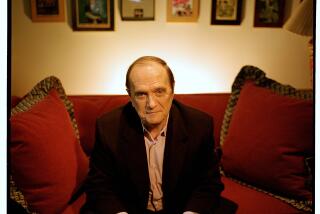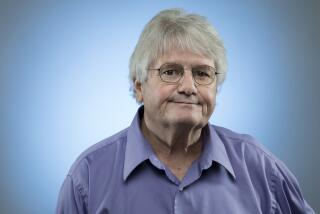‘I learned later he was known to the Chinese as “the man who kills while smiling.”’
Bob Prescott is known around Carlsbad as a former city councilman who likes to keep one foot in the local political scene. But before moving to Carlsbad, Prescott, 68, had a 25-year career in the military, which included a stint as a spy in China during World War II. His exploits as “Bob 826” serve as the basis for a long-overdue novel he is now completing, which he says is “a view of the war that’s never been published.” Prescott was interviewed in his home by Times staff writer Leslie Wolf and photographed by Barbara Martin.
I spent 25 years in the Marines and traveled all around the world and was involved in all kinds of things, including a very interesting cloak-and-dagger operation in China.
I decided to write a book about it nine years ago, and I started by taping all my memories. I also used a few letters my mom had saved that I had written to her, and I had a very sketchy diary kept by a friend of mine who was also in China. As it turned out, it’s not exactly the spy story that some people thought it would be.
It all started when I was 23, at Camp Lejeune in North Carolina. One day, my colonel said, “You’re leaving, you’ve got special duty overseas.” It was very sudden, and I didn’t know what was going on. I went to Washington, D.C., and they sent me to the Navy Department to see an Army officer. I thought that was kind of strange. Then, I was interviewed by two gentlemen from the OSS--the Office of Strategic Services, the forerunner of the CIA--and they wanted to know my entire life history, my hobbies, everything.
Finally, the captain said, “We’re going to give you the opportunity to volunteer for prolonged and hazardous duty in China for the duration of the war. You’ll be working with guerrillas, in occupied territory, and frankly we don’t expect more than half of you to come back.” Then, he started to get serious about all the horrible things that could happen to us over there. I said “yes,” of course.
It turned out they had sent a list of qualifications to various military bases around the country and asked them to select qualified people. I took a look at that list and said, “Who, me?” One of the other guys said, “You know, Jesus Christ himself wouldn’t have qualified.” We were a real mixed bunch, but we all had two things in common: We were survivors and we all had a good sense of humor.
I was then given a set of orders, told to read it, memorize it and destroy it. I was told to report for training in unmarked civilian clothes. We left our wallets, dog tags, everything that might identify us in Washington. I was told to stand on a certain street corner and wait for a certain car to pull up. After exchanging passwords, I was to get in. As it turned out, there was another man I knew in the car, but we had been instructed to show no signs of recognition to anyone.
They sent us to OSS training camp in Virginia for three weeks. We were known to each other only by our first names and numbers: I was Bob 826.
In China, we worked for Gen. Tai-li, the right-hand man to Chiang Kai-shek. I knew at that time he was head of the Chinese secret service--head of all covert activities. I learned later he was known to the Chinese as “the man who kills while smiling.”
At one point, we took a 10-truck convoy up the “silk route” to the Honan province, where we set up a base camp in a 2,000-year-old Buddhist temple. We were chased out by the Japanese six weeks later. It was a most irregular war--there were all kinds of deals going on. Some of our people actually stopped to buy gasoline from the Japanese army to fuel our trucks, while at the very same time they were supposed to be trying to catch us and kill us.
Later on, we blew up a few things, railroads and such, but we did not get to do as much undercover operating as we wanted to do because the Chinese had another agenda. It became clear they were not anxious to have us go out and participate in too many operations--they really were not that into fighting the Japanese. They were saving their men and their equipment for what one of the Chinese told me quite bluntly was “the war after you leave”--the upcoming war with the Communists for the control of China.
To an extent, the Chinese army just bailed out. They were not a very efficient army, and they just disintegrated. Also, the peasantry was very unhappy with the army. The soldiers were starving and started bartering their weapons for food from the peasants, so the peasants became armed and turned on the Chinese army. At the same time, the Japanese were chasing them around, and the communists were fighting with everybody just to try to stir things up. There were about five factions fighting each other and nobody knew what the heck was going on--it was a mess, not to mention hazardous to your health.
Now, I’m looking for some financial support for the book. I also have a couple of movie connections I’ve talked to and they’re interested in it. Hopefully, something will come out of it, and I’ve had fun doing it. If nothing else, at least my kids will know what their dad did during the war.
More to Read
Sign up for Essential California
The most important California stories and recommendations in your inbox every morning.
You may occasionally receive promotional content from the Los Angeles Times.










